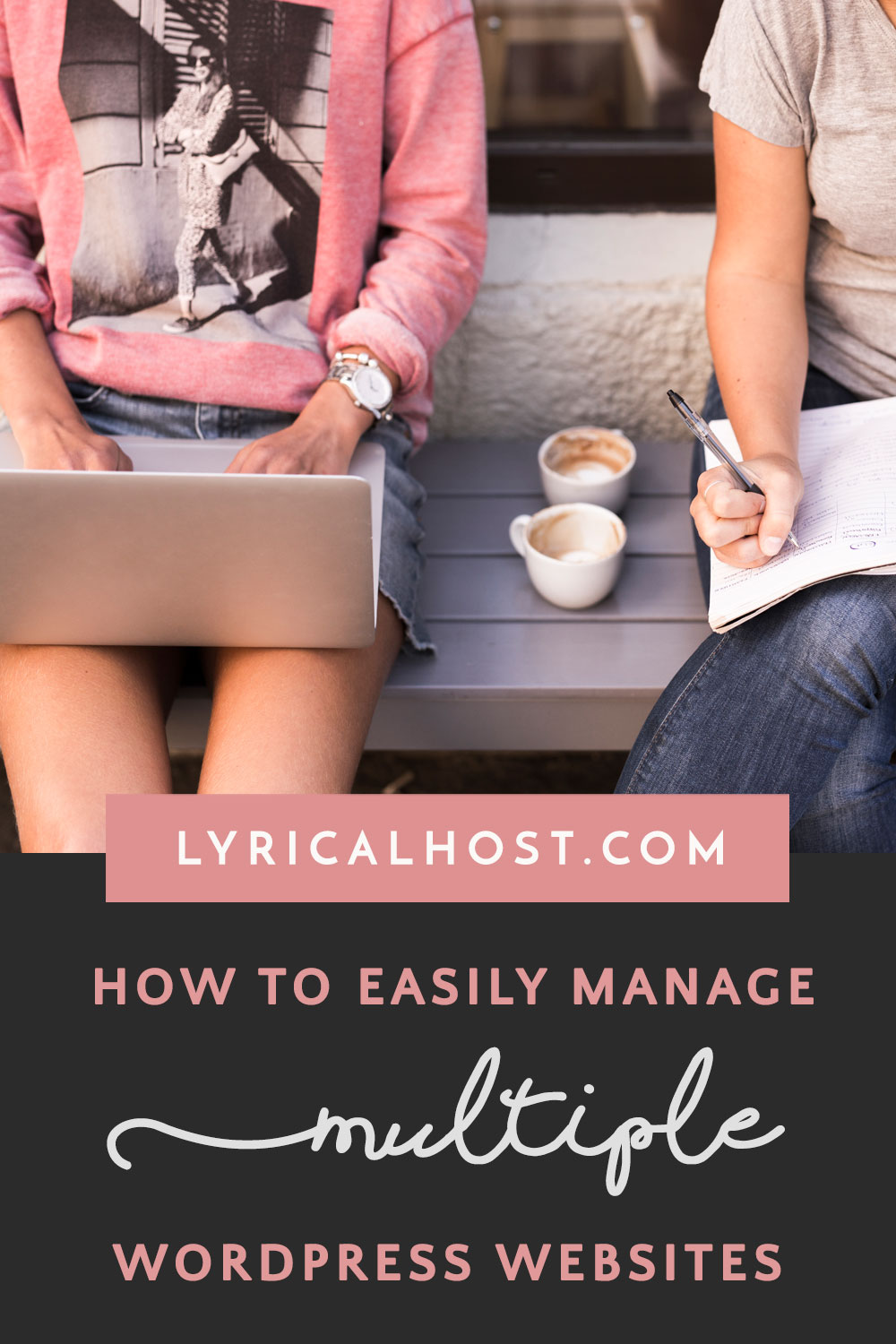Some people have just the one blog, whereas others are always dreaming of more! If you’ve been thinking about creating more WordPress websites, but you’re unsure of how to streamline the management of them so you can concentrate on the fun things, this post is for you.
Although we’ve called this post “How To Easily Manage Multiple Blogs,” you can apply much of this advice to any kind of WordPress website. So whether you’re managing several blogs, or mix and matching any kinds of websites from ecommerce stores to portfolios, you should hopefully be able to make use of this post.
Currently reading: How To Easily Manage Multiple Blogs (& Other WordPress Sites) Share on XSide note: If you’re a Lyrical Host customer, you can pick up a bumper PDF on this topic from our Resource Library. It’s 18 pages of tips and advice, and it’s totally free for you. Enjoy!
Why have multiple blogs or websites?
It could be any of the following reasons:
- You want to expand on your past success, or you’ve reached a ceiling/passive state with your first site.
- You want to create something entirely different, e.g. an ecommerce store or portfolio.
- You want to spread the risk and have more sources of income in case traffic to your main site is affected for some reason.
- You’re creating additional sites for the purpose of three way link swapping with other site owners.
- You’re looking to work with brands in a different niche.
- You’re looking to sell links and don’t want to risk your main site.
- You’re intending to create and flip sites for profit.
- You’re closely managing/maintaining client sites as part of an ongoing service.
- You’ve got a passion or advice to share in a totally different niche or with a different target audience to your current site.
Or, maybe you’re just addicted to creating sites (hey, it’s more productive than Netflix, we don’t judge!)
If you’re not sure whether to start another blog or website of your own, this post may help: When Is The Best Time To Start Another Website?
We recommend getting your first site properly established (if you haven’t already) before moving on to creating others. This is because your first will teach you a ton, and you don’t want to spread yourself too thin or end up frustrated because you’re not seeing the results you wanted. You can always grab your domain name for now, or write your idea somewhere and come back to it later.
Manage your own expectations
The key thing here is that not all your websites will have the same time, effort and weighting. Even if they’re all blogs, one blog is likely to be your primary focus or success above the others.
In many cases, a second, third or fourth (or more) website has a different purpose to your primary blog. For example it could be your portfolio or resume, a niche affiliate site, a blog you’re planning to flip, a password- protected way to document family photos/life for your relatives/the future, a site you’re using for three way link building, etc.
If you are creating a blog with the goal of it being similar to your first (for example, your blog is food/recipe-based blog earning money from ads/ affiliate links and you want to create a blog on parenting that also earns money from ads/affiliate links), you may want to switch focus for a while. Make sure you have enough planned and scheduled to keep your main blog ticking over, and put it on the back burner for a bit while you focus on the new one.
With that said, you may want to manage your expectations going in. Not all blogs and websites will see the same level of success; even if you use the tools and strategies you adopted for your first blog, that doesn’t guarantee the same results. You’ll need just as much patience, if not more, as you did the first time around, and be conscious that you may need to adapt or change some things if they aren’t working for you this time around.
01. Sign up for a website management tool
Whether you’re managing a bunch of sites for yourself or your clients, there are services out there that will let you add all your WordPress websites in one place and present them in one handy dashboard with information such as what updates are needed and what themes and plugins are in use, plus let you action things super easily. You can even create your own categories and add sites to them, which is really useful if your sites have different purposes or levels of importance to you.
The most popular tools for this are ManageWP, MainWP and InfiniteWP. They have free and premium plans; the free plans are pretty comprehensive (especially in combination with Lyrical Host hosting features) so it’s unlikely you’ll need to upgrade.
For creating the site itself, if you’re a Lyrical Host customer simply raise a ticket and we’ll get everything ready for you. If you’re buying a website from someone else, here’s a support article with more details about what you need to do.
02. Create your own “stack”
If you’re planning to create several websites, creating your own tech stack can be really helpful in speeding up your launch process. A stack is basically your own must-have list of what you need to install or set up for each of your new sites.
This could include:
- Themes – You may have a particular go-to theme or theme site that you go to, or a particular theme you favor for a particular type of site (e.g. you like Flatsome for WooCommerce stores).
- Plugins – You probably love specific plugins, so having a list of them rather than trying to remember them all is a big timesaver. If you’re not sure, a good starting point is 7 Free Must-Have Plugins.
- Contact methods – For example whether you’ll have a form, a different email address for each site, social media links, and so on.
- Basic pre-launch and launch task lists (for example, setting up a scheduled tweet about your new site).
Check out 5 Pages Every Blog Needs (works for other types of sites too!) and Blogging 101: Legal Essentials For Your Blog.
03. Plan your launch strategy and blog content
– See what you can repurpose; you may have created content that isn’t published on the web in written form that you can pull or transcribe. This could be things like podcast episodes, YouTube videos, IGTV videos, Lives, lead magnets/opt-ins you don’t use any more, unpublished posts that no longer suited your site, mostly finished drafts you never published, guest posts you wrote and never placed, emails where you advised people or gave “how to” advice that could be adapted etc.
– Plan out topics for one site at a time, even if it’s just titles/vague ideas to begin with, and save as a draft post within that site. That way you always have your drafts list to hand and you aren’t getting distracted with other sites.
– Don’t put pressure on yourself to stick to a specific posting schedule or anything like that. It’s better to write one post occasionally and save your mental health. Your website will wait for you!
What are your thoughts on creating new sites? Let us know in the comments!
Enjoyed this post? Pin it:







No Comments